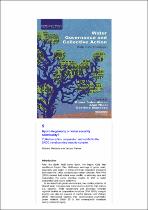 ResearchSpace
ResearchSpace
Hydro-hegemony or water security community? Collective action, cooperation and conflict in the SADC transboundary security complex
JavaScript is disabled for your browser. Some features of this site may not work without it.
- ResearchSpace
- →
- Research Publications/Outputs
- →
- Book Chapters
- →
- View Item
| dc.contributor.author |
Meissner, Richard

|
|
| dc.date.accessioned | 2017-11-15T12:32:43Z | |
| dc.date.available | 2017-11-15T12:32:43Z | |
| dc.date.issued | 2017-09 | |
| dc.identifier.citation | Meissner, R. 2017. Hydro-hegemony or water security community? Collective action, cooperation and conflict in the SADC transboundary security complex. In: Suhardiman, D., Nicol, A. and Mapedza, E. (eds). Water governance and collective action: Multi-scale Challenges, pp. 80-100 | en_US |
| dc.identifier.isbn | 9781138040540 | |
| dc.identifier.uri | https://www.routledge.com/Water-Governance-and-Collective-Action-Multi-scale-Challenges/Suhardiman-Nicol-Mapedza/p/book/9781138040595 | |
| dc.identifier.uri | https://www.researchgate.net/publication/320443016_EntHydro-Hegemony_or_Water_Security_Community_Collective_Action_Cooperation_and_Conflict_in_the_SADC_Transboundary_Security_Complexer_title | |
| dc.identifier.uri | http://hdl.handle.net/10204/9782 | |
| dc.description | Copyright: 2017 Routledge. Due to copyright restrictions, the attached PDF file only contains the abstract of the full text item. For access to the full text item, please consult the publisher's website. | en_US |
| dc.description.abstract | In an anarchical global environment, the conflict potential of shared water resources has made rivers subject to high politics (i.e. security). While researchers and diplomats consider regional treaties as cooperation indicators (Wold 1995), unequal treaties can also be sources of conflict (Warner and Zeitoun 2008). International regimes may institutionalize asymmetric power relations (Kistin 2011), and consequently constitute enmity instead of equity. | en_US |
| dc.language.iso | en | en_US |
| dc.publisher | Routledge, Taylor & Francis | en_US |
| dc.relation.ispartofseries | Worklist;19727 | |
| dc.subject | Water security | en_US |
| dc.subject | Water governance | en_US |
| dc.title | Hydro-hegemony or water security community? Collective action, cooperation and conflict in the SADC transboundary security complex | en_US |
| dc.type | Book Chapter | en_US |
| dc.identifier.apacitation | Meissner, R. (2017). Hydro-Hegemony or water security community? Collective action, cooperation and conflict in the SADC transboundary security complex., <i>Worklist;19727</i> Routledge, Taylor & Francis. http://hdl.handle.net/10204/9782 | en_ZA |
| dc.identifier.chicagocitation | Meissner, Richard. "Hydro-hegemony or water security community? Collective action, cooperation and conflict in the SADC transboundary security complex" In <i>WORKLIST;19727</i>, n.p.: Routledge, Taylor & Francis. 2017. http://hdl.handle.net/10204/9782. | en_ZA |
| dc.identifier.vancouvercitation | Meissner R. Hydro-hegemony or water security community? Collective action, cooperation and conflict in the SADC transboundary security complex.. Worklist;19727. [place unknown]: Routledge, Taylor & Francis; 2017. [cited yyyy month dd]. http://hdl.handle.net/10204/9782. | en_ZA |
| dc.identifier.ris | TY - Book Chapter AU - Meissner, Richard AB - In an anarchical global environment, the conflict potential of shared water resources has made rivers subject to high politics (i.e. security). While researchers and diplomats consider regional treaties as cooperation indicators (Wold 1995), unequal treaties can also be sources of conflict (Warner and Zeitoun 2008). International regimes may institutionalize asymmetric power relations (Kistin 2011), and consequently constitute enmity instead of equity. DA - 2017-09 DB - ResearchSpace DP - CSIR KW - Water security KW - Water governance LK - https://researchspace.csir.co.za PY - 2017 SM - 9781138040540 T1 - Hydro-hegemony or water security community? Collective action, cooperation and conflict in the SADC transboundary security complex TI - Hydro-hegemony or water security community? Collective action, cooperation and conflict in the SADC transboundary security complex UR - http://hdl.handle.net/10204/9782 ER - | en_ZA |





